‘Big Gay Sing’ unites music, comedy, drag queens in fun filled hour
Bob Evans | AXS.com
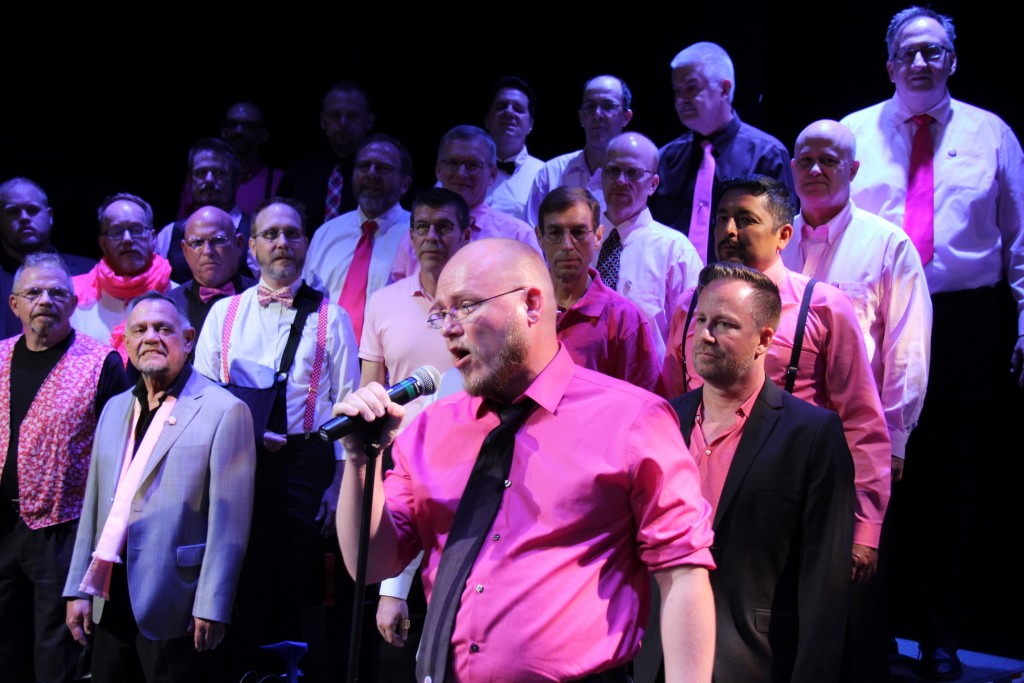 Dust off the vocal pipes, clap hands, snap fingers, sing along, and laugh a lot when viewing the Heartland Men’s Chorus in their Kansas City Fringe Festival 2015 entry, “Big Gay Sing,” that entertained many in its three day weekend run at Kansas City’s historic Union Station.
Dust off the vocal pipes, clap hands, snap fingers, sing along, and laugh a lot when viewing the Heartland Men’s Chorus in their Kansas City Fringe Festival 2015 entry, “Big Gay Sing,” that entertained many in its three day weekend run at Kansas City’s historic Union Station.
Drag Queens, Daisy Buckët and Summer Tryst acted as mistresses of ceremony and also preformed to the delight of the audiences. Heartland Men’s Chorus brought an abbreviated number of members to the songfest for the Fringe Festival.
According to their Fringe blurb, “Come sing your heart out with the gays! ‘Big Gay Sing!’ is a fun-filled, sing-a-long-tastic evening complete with all of your favorite big gay songs. This collision of karaoke bar and choir concert features fabulous singers, a live band, lyrics on the screen for you to sing along and special guest soloists and first-time drag performers straight from the audience. Join Heartland Men’s Chorus and host, Kansas City’s songstress drag queen, Daisy Buckët, in a concert event where you are the star.”
The show was fast paced, fun and full of audience members singing along and signaling approval with tons of laughter, clapping and loud singing. This performance differs from the HMC’s normal concert format where they present longer concert-style shows throughout the year. This show delivered fast-paced music, happy music, and encouraged the audience to sing their hearts out.
“Big Gay Sing” stands as one of the contenders for Best of Venue with packed performances and strong ticket sales. The show stands out as one of the premiere musical entries of the 2015 KC Fringe.
About the Fringe: The Kansas City Fringe Festival begins its second decade with this year’s slate of performances. The 2015 festival opens with a night of “Teasers” on Thursday, July 17. Performances begin on Friday, July 18 and run through July 26. Some shows present three times, while others have 4-6 performances. No all shows occur on consecutive days or at the same times. To be admitted to the Fringe, patrons need to purchase a Fringe button for $5. To purchase individual show tickets, the Fringe button needs to be shown. Fringe buttons are available at all venues.
Fringe shows run at about a dozen different venues throughout the Kansas City, Missouri downtown and midtown areas. Shows range from comedies, dramas, musicals, vocals, instrumentals, stand up, improvisation, burlesque and more. Many shows make their debut at the Fringe in hopes of further development and productions.
Most Fringe shows are 60 minutes. A few Fringe shows are 90 minutes. Further information is available through the Fringe official website.

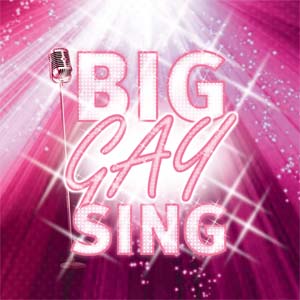 Possibly the most FABULOUS addition to this year’s Fringe Festival, Heartland Men’s Chorus’s Big Gay Sing! brings the audience into the action with a big-screen projection of each and every wonderful word of all the anthemic pop songs they perform. The audience is encouraged to— nay, almost shamed into— singing along, by songstress drag queen Daisy Buckët and her friend Summer Tryst, which is not a difficult task when you consider the material the audience gets to sing. The works of Journey, ABBA, Meghan Trainor, and more feature in this musical extravaganza that got the whole room on their feet and partying along with HMC.
Possibly the most FABULOUS addition to this year’s Fringe Festival, Heartland Men’s Chorus’s Big Gay Sing! brings the audience into the action with a big-screen projection of each and every wonderful word of all the anthemic pop songs they perform. The audience is encouraged to— nay, almost shamed into— singing along, by songstress drag queen Daisy Buckët and her friend Summer Tryst, which is not a difficult task when you consider the material the audience gets to sing. The works of Journey, ABBA, Meghan Trainor, and more feature in this musical extravaganza that got the whole room on their feet and partying along with HMC.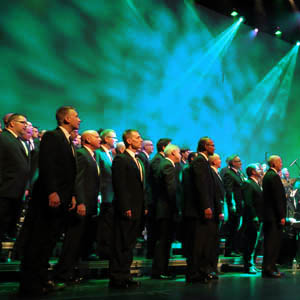
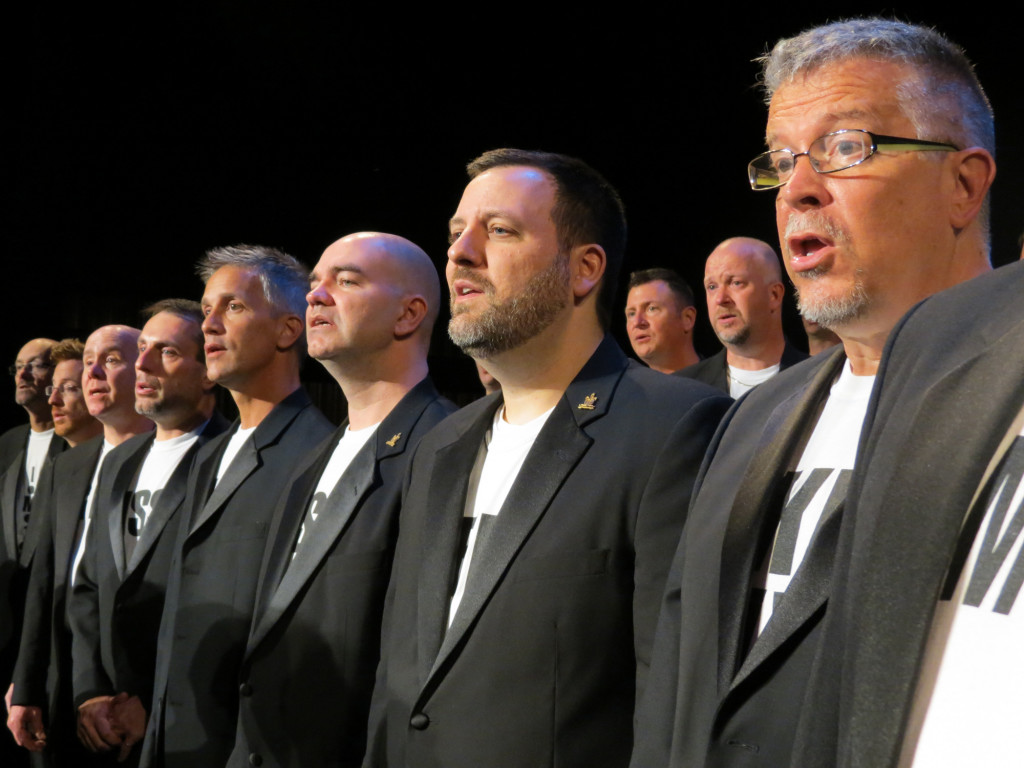 There’s a zephyr wind blowing through gay men’s choirs in America, and Heartland Men’s Chorus appears to have found just the right man to take it into this new era of acceptance and tolerance. On June 13th and 14th, Dustin Cates concludes his brilliant first season as the choir’s artistic director with “A Little Bit Wicked: The Music of Stephen Schwartz,” and the 35-year-old Kansas City native is fully aware of how much things have changed since the choir was founded just a few years after he was born. But he says that, even as the choir is becoming more inclusive and is likely to continue this trend, its goal remains the same: “The mission of Heartland Men’s Chorus is to sing, and to change people,” says the former choir director at Olathe East High School, who attended Ruskin High and has degrees from UMKC Conservatory of Music and Dance and Baker University in Baldwin. “To help them heal, and to inspire them.” Granted, “as ‘gay’ becomes more ‘okay,’ as it is more widely accepted, we’re going to have things to say about a wider variety of issues. Because Heartland Men’s Chorus stands for equality for all people, not just for gay folks.”
There’s a zephyr wind blowing through gay men’s choirs in America, and Heartland Men’s Chorus appears to have found just the right man to take it into this new era of acceptance and tolerance. On June 13th and 14th, Dustin Cates concludes his brilliant first season as the choir’s artistic director with “A Little Bit Wicked: The Music of Stephen Schwartz,” and the 35-year-old Kansas City native is fully aware of how much things have changed since the choir was founded just a few years after he was born. But he says that, even as the choir is becoming more inclusive and is likely to continue this trend, its goal remains the same: “The mission of Heartland Men’s Chorus is to sing, and to change people,” says the former choir director at Olathe East High School, who attended Ruskin High and has degrees from UMKC Conservatory of Music and Dance and Baker University in Baldwin. “To help them heal, and to inspire them.” Granted, “as ‘gay’ becomes more ‘okay,’ as it is more widely accepted, we’re going to have things to say about a wider variety of issues. Because Heartland Men’s Chorus stands for equality for all people, not just for gay folks.”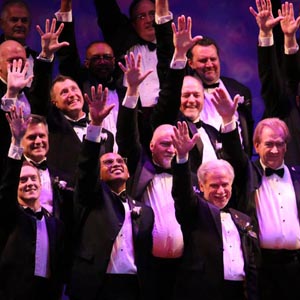 Author Richard Bach once stated, “The bond that links your true family is not one of blood, but of respect and joy in each other’s life.” It is these beyond extrafamilial bonds that the Heartland Men’s Chorus along with special guest ensemble the Lawrence Children’s Choir explored to packed Folly Theater on Saturday evening’s “Modern Families.”
Author Richard Bach once stated, “The bond that links your true family is not one of blood, but of respect and joy in each other’s life.” It is these beyond extrafamilial bonds that the Heartland Men’s Chorus along with special guest ensemble the Lawrence Children’s Choir explored to packed Folly Theater on Saturday evening’s “Modern Families.”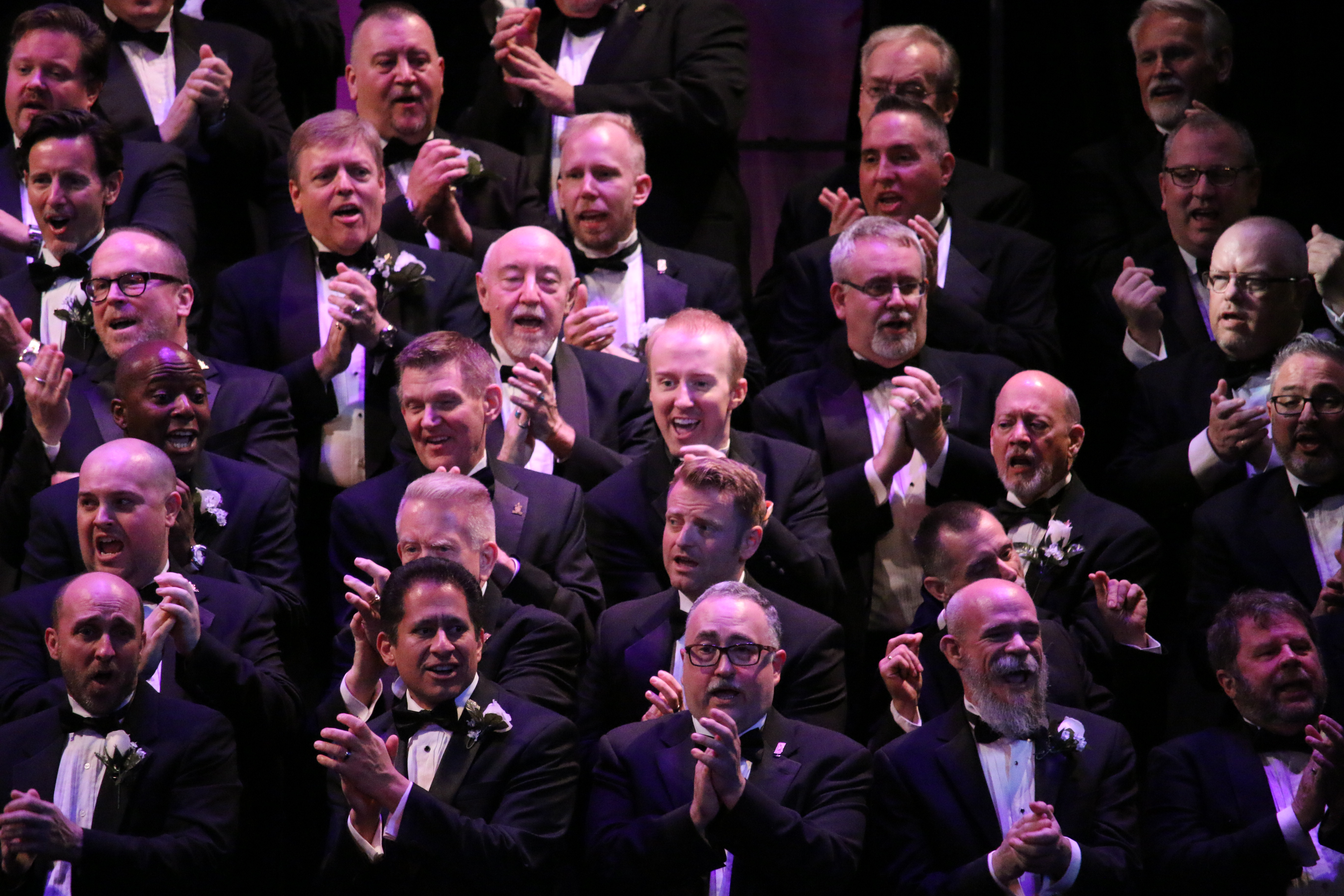
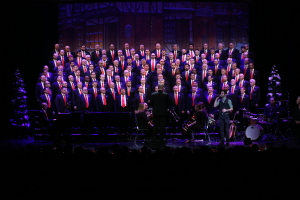 The outstanding musical production of Kansas City Christmas opened the 29th season of the
The outstanding musical production of Kansas City Christmas opened the 29th season of the 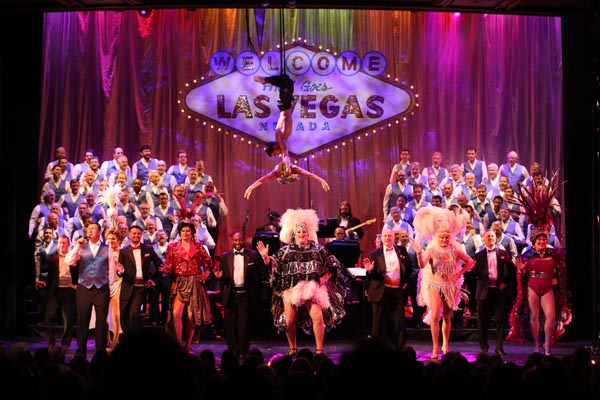 Helmed by guest director Anthony Edwards, Heartland Men’s Chorus presented an historical retrospective on the Vegas of yesteryear for its Vegas, Baby program’s first half. Following a bluesy “Route 66,” the group performed hits that naturally conjure the Sunset Strip’s glory days, from gambling (“Luck Be a Lady Tonight”) to the Rat Pack (“Mack the Knife,” “That Old Black Magic”) to Mr. Las Vegas himself, Wayne Newton (“Danke Schoen”). “This Could Be the Start of Something,” made famous by Steve Allen and sung by HMC soloists Ben Helmers and Rob Hill, brought to mind Vegas as popular quickie wedding destination.
Helmed by guest director Anthony Edwards, Heartland Men’s Chorus presented an historical retrospective on the Vegas of yesteryear for its Vegas, Baby program’s first half. Following a bluesy “Route 66,” the group performed hits that naturally conjure the Sunset Strip’s glory days, from gambling (“Luck Be a Lady Tonight”) to the Rat Pack (“Mack the Knife,” “That Old Black Magic”) to Mr. Las Vegas himself, Wayne Newton (“Danke Schoen”). “This Could Be the Start of Something,” made famous by Steve Allen and sung by HMC soloists Ben Helmers and Rob Hill, brought to mind Vegas as popular quickie wedding destination.
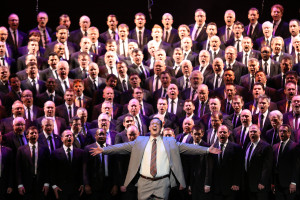 “We gotta give them hope.” These words of Harvey Milk, the first openly gay person elected to public office, were taken to heart by the Heartland Men’s Chorus, who joined with the Gateway Men’s Chorus from St. Louis this weekend at the Folly Theater. After each ensemble sang selections of their own, Andrew Lippa’s large work I Am Harvey Milk received its Midwest premiere, forcing an element of introspection on the part of everyone present and a call for action to end all remaining hate.
“We gotta give them hope.” These words of Harvey Milk, the first openly gay person elected to public office, were taken to heart by the Heartland Men’s Chorus, who joined with the Gateway Men’s Chorus from St. Louis this weekend at the Folly Theater. After each ensemble sang selections of their own, Andrew Lippa’s large work I Am Harvey Milk received its Midwest premiere, forcing an element of introspection on the part of everyone present and a call for action to end all remaining hate.